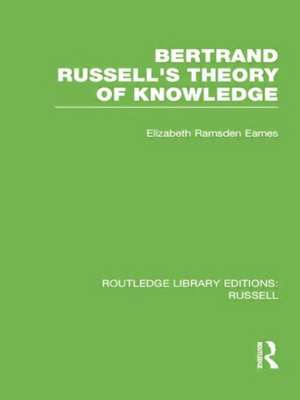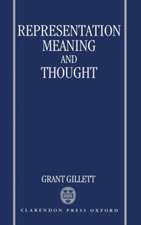Bertrand Russell's Theory of Knowledge: Routledge Library Editions: Russell
Autor Elizabeth Ramsden Eamesen Limba Engleză Paperback – 4 iul 2014
The analysis starts with Russell’s earliest views and moves from book to book and article to article through his enormous span of writing on the problems and theory of knowledge. The changes in ideas as he developed the theory are traced, and the study culminates in a statement of his latest views. His work is seen in a continuity in which the changes were part of the development of his mature thought, and the total evaluation and interpretation clarify many of the common misunderstandings of his philosophy.
This is naturally of interest to all philosophers, and for students this is the answer to inevitable questions on the nature of Russell’s ideas and their evolution.
| Toate formatele și edițiile | Preț | Express |
|---|---|---|
| Paperback (1) | 410.46 lei 6-8 săpt. | |
| Taylor & Francis – 4 iul 2014 | 410.46 lei 6-8 săpt. | |
| Hardback (1) | 766.85 lei 6-8 săpt. | |
| Taylor & Francis – 20 noi 2012 | 766.85 lei 6-8 săpt. |
Preț: 410.46 lei
Nou
Puncte Express: 616
Preț estimativ în valută:
78.54€ • 82.01$ • 64.86£
78.54€ • 82.01$ • 64.86£
Carte tipărită la comandă
Livrare economică 15-29 aprilie
Preluare comenzi: 021 569.72.76
Specificații
ISBN-13: 9781138008175
ISBN-10: 1138008176
Pagini: 240
Dimensiuni: 156 x 234 x 15 mm
Greutate: 0.32 kg
Ediția:1
Editura: Taylor & Francis
Colecția Routledge
Seria Routledge Library Editions: Russell
Locul publicării:Oxford, United Kingdom
ISBN-10: 1138008176
Pagini: 240
Dimensiuni: 156 x 234 x 15 mm
Greutate: 0.32 kg
Ediția:1
Editura: Taylor & Francis
Colecția Routledge
Seria Routledge Library Editions: Russell
Locul publicării:Oxford, United Kingdom
Public țintă
General, Postgraduate, and UndergraduateCuprins
Preface 1. Introduction 2. The Nature of Philosophy 3. The Method of Analysis 4. Russell’s Empiricism 5. Realism 6. Conclusion
Descriere
Until this book was first published in 1969 no comprehensive treatment of Russell's epistemology had appeared. It challenges assumptions held previously and draws attention to features of Russell’s later work. The analysis starts with Russell’s earliest views and moves from book to book and article to article through his enormous span of writing on the problems and theory of knowledge – this total evaluation and interpretation clarifies many of the common misunderstandings of his philosophy.


























